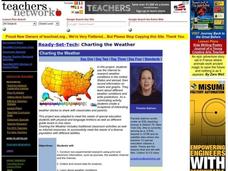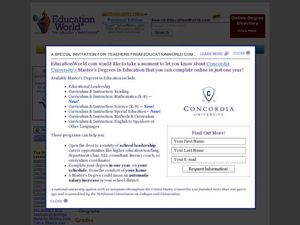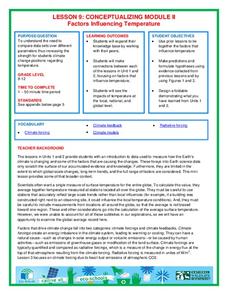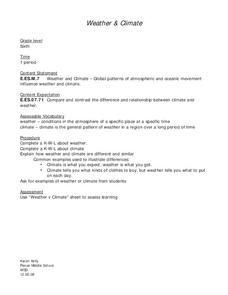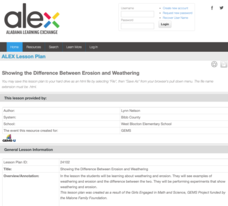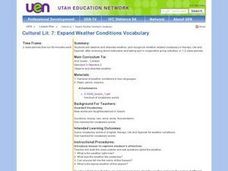Curated OER
A Walk in the Tundra
Discuss the environment of the Arctic tundra using this resource. The focus of this lesson is the story A Walk in the Tundra by Rebecca L. Johnson. The appealing illustrations are bound to captivate your class! After reading the...
Curated OER
Charting the Weather
Students research and conduct non-experimental research, such as journals, the weather channel and the internet, to collect and record data for analysis on weather conditions in the United States and abroad. They identify, pronounce and...
Curated OER
Strange Winter Weather Affects Nature, People
Learners react to a series of statements about the weather, then read a news article about the affect of unusual winter weather on people and animals. In this meteorology and current events lesson, the teacher introduces an article with...
Curated OER
Mira: Activity 10
Students read the story, Mira and then draw a picture of their favorite weather using the story as a background. They post their pictures around the room and make a tally chart of the number of pictures that were drawn with various...
Curated OER
Wild Weather
Students access a weather word crossword puzzle using a web site. They complete the puzzle by accessing web sites that are associated with each question. They create an original crossword puzzle using the web sites.
Curated OER
Weather on the Internet
What the weather like today? How about in other countries? In Celsius and Fahrenheit? Have your learners use the Internet to look up the weather in Spanish! They'll discuss their findings in Spanish with a partner and create a chart over...
Curated OER
Crocodiles Escape in Vietnam
What, there was a crocodile escape? Read, analyze, and examine a newspaper article with your class about the crocodiles that escaped in Vietnam. Your English language learners note the facts and key vocabulary in the story and answer...
Curated OER
Weathering Rocks
Fourth graders investigate what natural events cause rocks to break apart and differentiate between erosion and weathering. They conduct an experiment with plaster of paris to observe why some rocks are hard and others break, and...
National Wildlife Federation
Conceptualizing Module II - Putting It All Together
"Creativity is just connecting things." - Steve Jobs. After weeks of researching climate change, the ninth lesson in a series of 21 combines the data and analysis to address essential questions. It covers natural phenomenon, human...
Curated OER
Create a Weather Newscast
Fourth graders explore and study basic weather terms, strengthen research skill on the web and create a weather newscast. They choose a weather site on the web, copy weather maps and create a videotape based on a written script to...
Curated OER
Weather & Climate
Sixth graders differentiate weather and climate. In this earth science lesson plan, 6th graders complete a KWL chart about the two. They complete a worksheet by identifying whether a certain statement describes weather or climate.
Prestwick House
Connotative vs. Denotative Meanings
Besides the dictionary definition, words also carry the added weight of meanings that are inferred or implied, meanings conferred on words, or connotations. To gain an understanding the importance of connotation, class members...
Curated OER
Introduce Vocabulary: Dinosaur Bones
Students discover the meaning of tier two vocabulary words. In this vocabulary lesson, students read Dinosaur Bones, listening for 3 pre-selected, tier two vocabulary words. Words are defined by the teacher and students practice...
Alabama Learning Exchange
Showing the Difference between Erosion and Weathering
Learners explore the concepts of weathering and erosion. After viewing pictures of both erosion and weathering, young scholars work in pairs to conduct an experiment with sugar cubes, water, sand, and a straw. They write their...
Curated OER
Adele's ESL Corner: A Lovely Day-Vocabulary
In this ESL vocabulary worksheet, students use words given at the top of the page to fill in blanks and complete a paragraph. Students may click on a button to hear the audio version.
Curated OER
Weather Words
Third graders gather together as a class and share any facts or words about the science unit "Weather Elements". They listen to the story/poem, "Listen to the Rain" and recall any weather related words from the story.
Curated OER
New Vocabulary: The Ugly Duckling
The class hears the story of The Ugly Duckling to build vocabulary. They hear the story, then pull three to four vocabulary words from the text. The teacher then helps them use the context of each sentence to construct a meaning for each...
Curated OER
Graphing Changes in Weather
Students graph current temperature and weather conditions for three days. In this weather lesson, students go to the Weather Channel's website and look up weather for their zip code then graph the conditions and record the current...
Curated OER
Weather and Seasons: What's the Weather Like in Spring
In this vocabulary worksheet, students unscramble 21 words that relate to spring weather. Students then find the unscrambled words in a word search puzzle.
Curated OER
Dressing for the Weather
In this weather vocabulary worksheet, young scholars locate 17 terms in the word search. Students use the terms and a chart provided to categorize the terms as weather, clothing, or things we do.
Curated OER
Weather Watchers
Students practice using objective and quantitative means to describe and compare the weather. They compile weather conditions and create a spreadsheet to record their findings.
Curated OER
Cloudy With a Chance of Meatballs-Part I
Here is a lesson plan that gives learners a chance to practice using context clues. They read the story, Cloudy with a Chance of Meatballs. Students use different word strategies (base words, synonyms, antonyms) to decode and understand...
Curated OER
Cultural Lit. 7: Expand Weather Conditions Vocabulary
Second graders study and observe weather. They identify weather related vocabulary in Navajo, Ute, Spanish and English after working in direct instruction and small group activities.
Curated OER
Recording Local Weather
Second graders measure, record, graph, and report changes in local weather using Navajo, Ute, and Spanish words for weather conditions. They record the weather results on a graph, and create drawings of weather conditions.

